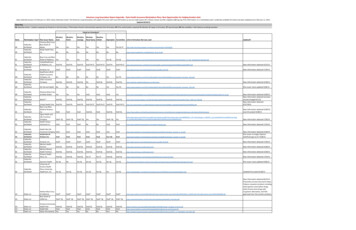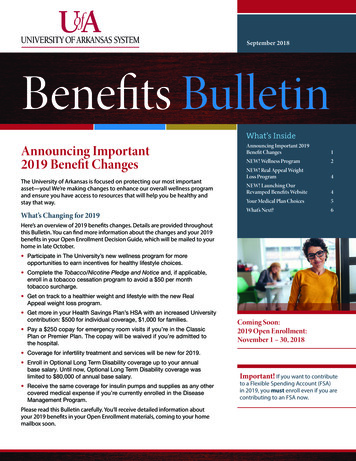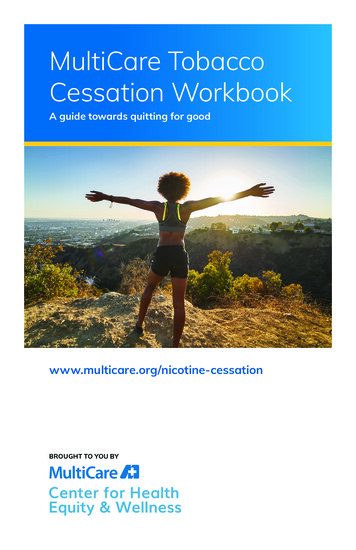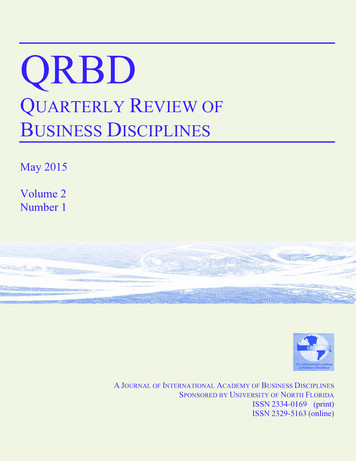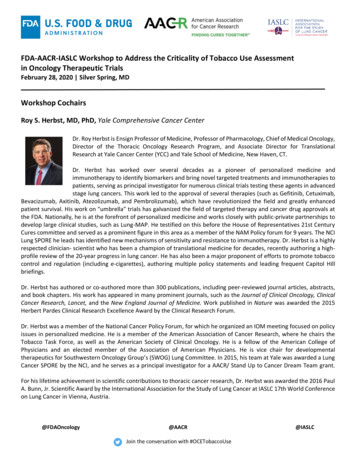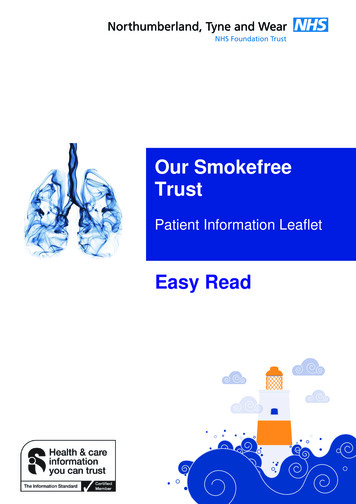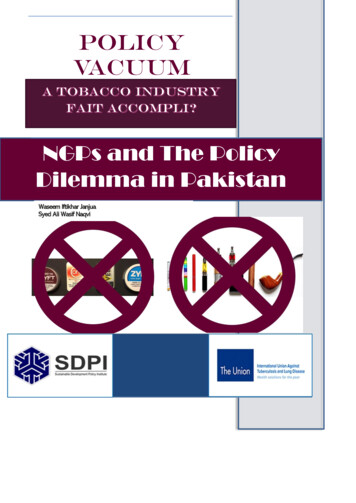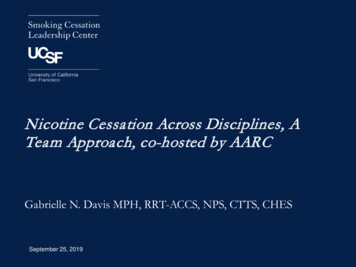
Transcription
Nicotine Cessation Across Disciplines, ATeam Approach, co-hosted by AARCGabrielle N. Davis MPH, RRT-ACCS, NPS, CTTS, CHESSeptember 25, 2019
ModeratorBrian ClarkSenior Project AnalystSmoking Cessation Leadership CenterUniversity of California, San FranciscoBrian.clark@ucsf.eduSmoking Cessation Leadership Center9/25/19
DisclosuresThis UCSF CME activity was planned and developed to uphold academic standards to ensure balance,independence, objectivity, and scientific rigor; adhere to requirements to protect health information underthe Health Insurance Portability and Accountability Act of 1996 (HIPAA); and include a mechanism to informlearners when unapproved or unlabeled uses of therapeutic products or agents are discussed or referenced.The following faculty speakers, moderators, and planning committee members have disclosed they have nofinancial interest/arrangement or affiliation with any commercial companies who have provided products orservices relating to their presentation(s) or commercial support for this continuing medical educationactivity:Christine Cheng, Brian Clark, Gabrielle N. Davis MPH, RRT-ACCS, NPS, CTTS, CHES,Jennifer Lucero, MA, MS, Jennifer Matekuare, Ma Krisanta Pamatmat, MPH, Jessica Safier,MA, Catherine Saucedo, Steven A. Schroeder, MD, and Shawna Strickland, PhDSmoking Cessation Leadership Center9/25/19
Thank you to our co-sponsorsAmerican Association for Respiratory CareSmoking Cessation Leadership Center
Thank you to our fundersSmoking Cessation Leadership Center
Housekeeping All participants will be in listen only mode. Please make sure your speakers are on and adjust thevolume accordingly. If you do not have speakers, please request thedial-in via the chat box. This webinar is being recorded and will be available onSCLC’s website, along with the slides. Use the chat box to send questions at any time for thepresenters.Smoking Cessation Leadership Center
CME/CEU StatementAccreditation:The University of California, San Francisco (UCSF) School of Medicine is accredited by the Accreditation Council for ContinuingMedical Education to provide continuing medical education for physicians.UCSF designates this live activity for a maximum of 1.0 AMA PRA Category 1 CreditTM. Physicians should claim only the creditcommensurate with the extent of their participation in the webinar activity.Advance Practice Registered Nurses and Registered Nurses: For the purpose of recertification, the American NursesCredentialing Center accepts AMA PRA Category 1 CreditTM issued by organizations accredited by the ACCME.Physician Assistants: The National Commission on Certification of Physician Assistants (NCCPA) states that the AMA PRACategory 1 CreditTM are acceptable for continuing medical education requirements for recertification.California Pharmacists: The California Board of Pharmacy accepts as continuing professional education those courses thatmeet the standard of relevance to pharmacy practice and have been approved for AMA PRA category 1 CreditTM. If you are apharmacist in another state, you should check with your state board for approval of this credit.California Marriage & Family Therapists: University of California, San Francisco School of Medicine (UCSF) is approved bythe California Association of Marriage and Family Therapists to sponsor continuing education for behavioral health providers.UCSF maintains responsibility for this program/course and its content.Course meets the qualifications for 1.0 hour of continuing education credit for LMFTs, LCSWs, LPCCs, and/or LEPs asrequired by the California Board of Behavioral Sciences.Respiratory Therapists: This program has been approved for a maximum of 1.0 contact hour Continuing Respiratory CareEducation (CRCE) credit by the American Association for Respiratory Care, 9425 N. MacArthur Blvd. Suite 100 Irving TX 75063,Course # 181746000.Smoking Cessation Leadership Center9/25/19
American Association forRespiratory Care (AARC) Free Continuing Respiratory Care Education credits (CRCEs)are available to Respiratory Therapists who attend this livewebinar Instructions on how to claim credit will be included in our postwebinar emailSmoking Cessation Leadership Center
New Behavioral Health AccreditationCalifornia Association of Marriage and Family Therapists (CAMFT)This webinar is accredited through the CAMFT for up to 1.0 CEU forthe following eligible California providers: Licensed Marriage and Family Therapists (LMFTs) Licensed Clinical Social Workers (LCSWs) Licensed Professional Clinical Counselors (LPCCs) Licensed Educational Psychologists (LEPs)Instructions to claim credit for these CEU opportunities will beincluded in the post-webinar email and posted to our website.
California Behavioral Health &Wellness InitiativeFor our CA residents, we are starting a new venture in CA helpingbehavioral health organizations go tobacco free and integratingcessation services into existing services thanks to the support of theCTCP.Free CME/CEUs will be available for all eligible California providers,who joined this live activity. You will receive a separate post-webinaremail with instructions to claim credit.Visit CABHWI.ucsf.edu for more information.
Tips Campaign Overview1.2.CDC. Current Cigarette Smoking Among Adults—United States, 2005–2014. MMWR 2015;64(44):1233–40The Health Consequences of Smoking—50 Years of Progress: A Report of the Surgeon General. Atlanta: HHS,CDC, NCCDPHP, OSH, 20149/24/2019
Free 1-800 QUIT NOW cards Refer your clients to cessation servicesSmoking Cessation Leadership Center
PresenterGabrielle N. Davis MPH, RRT-ACCS,NPS, CTTS, CHESCOPD Educator & Inpatient NicotineCessation Program CoordinatorSt. Luke's Health SystemSmoking Cessation Leadership Center
Nicotine Cessation AcrossDisciplines, A TeamApproachGabrielle Davis MPH, RRT-ACCS, NPS, CTTS, CHESSeptember 25, 2019
DISCLOSUREI have no actual or potential personal orprofessional conflicts of interest inrelation to this presentation.
OBJECTIVES Identify meaningful ways to build rapport duration cessation facilitation Examine biases around nicotine use in marginalized communities Demonstrate brief motivational interviewing techniques associated withcessation Describe the value in using respiratory therapists and behavioral health cliniciansin nicotine cessation
FACTSIllnesses related to nicotineaddiction remains the numberone cause of preventable death.Center for Substance Abuse Treatment. Enhancing Motivation for Change in Substance Abuse Treatment. Rockville (MD): Substance Abuse and Mental Health ServicesAdministration (US); 1999. (Treatment Improvement Protocol (TIP) Series, No. 35.) Chapter 3—Motivational Interviewing as a Counseling Style. Available from:https://www.ncbi.nlm.nih.gov/books/NBK64964/
FACTSVerbiage regarding nicotineaddiction and cessation is largelyunderrepresented in literaturedue to newer phenomenaincluding nicotine addictionwithout out use of tobacco.
FACTS Big Tobacco fought againstmaking hospitals ‘smokefree’.Center for Substance Abuse Treatment. Enhancing Motivation for Change in Substance Abuse Treatment. Rockville (MD): Substance Abuse and Mental Health Services Administration(US); 1999. (Treatment Improvement Protocol (TIP) Series, No. 35.) Chapter 3—Motivational Interviewing as a Counseling Style. Available from:https://www.ncbi.nlm.nih.gov/books/NBK64964/
FACTS People with mental conditionsaccount for more than 60% ofcigarette purchases in the UnitedStates.Center for Substance Abuse Treatment. Enhancing Motivation for Change in Substance Abuse Treatment. Rockville (MD): Substance Abuse and Mental Health Services Administration (US);1999. (Treatment Improvement Protocol (TIP) Series, No. 35.) Chapter 3—Motivational Interviewing as a Counseling Style. Available from: https://www.ncbi.nlm.nih.gov/books/NBK64964/
NICOTINE ADDICTION IN MARGINALIZEDPOPULATIONS 35.5% of transgender adults usenicotine 26.9% of LGB adults usenicotine 14.9% of cisgender &heterosexual adults usenicotine LGBTQIA young adults (18-24)are 2x more likely to smoke Project SCUM Major sponsors at LGBTQIA events Presented as a way to ‘rebel’during early gay rightsmovementsCenter for Substance Abuse Treatment. Enhancing Motivation for Change in Substance Abuse Treatment. Rockville (MD): Substance Abuse and Mental Health ServicesAdministration (US); 1999. (Treatment Improvement Protocol (TIP) Series, No. 35.) Chapter 3—Motivational Interviewing as a Counseling Style. Available from:https://www.ncbi.nlm.nih.gov/books/NBK64964/
NICOTINE ADDICTION IN MARGINALIZEDPOPULATIONS Stigma regarding seeking out therapy or any help with cessation Easier access to convenience stores with nicotinic products stemming from‘redlining’ Less likely to reach out for assistance due to inherently higher resilience Less access to overall viewcontent.cgi?referer http://www.google.com/url?sa t&rct j&q &esrc s&source web&cd 15&ved 2ahUKEwiB5s uiOrkAhXH854KHcF9BDEQFjAOegQICRAB&url usg AOvVaw39Su0ZpPiP6rifjuuH7Mtj&httpsredir 1&article 1012&context jhdrp
NICOTINE ADDICTION IN MARGINALIZEDPOPULATIONS 10x more tobacco advertisements in Black neighborhoods More tobacco retailers near schools in low-income areas Increased amounts of advertising budgets in place for use with Blackpublications Believed to be a stress reliever, and is more affordableCenter for Substance Abuse Treatment. Enhancing Motivation for Change in Substance Abuse Treatment. Rockville (MD):Substance Abuse and Mental Health Services Administration (US); 1999. (Treatment Improvement Protocol (TIP) Series, No. 35.)Chapter 3—Motivational Interviewing as a Counseling Style. Available from: https://www.ncbi.nlm.nih.gov/books/NBK64964/
NICOTINE ADDICTION IN MARGINALIZEDPOPULATIONSCenter for Substance Abuse Treatment. Enhancing Motivation for Change in Substance Abuse Treatment. Rockville (MD): Substance Abuse and Mental Health ServicesAdministration (US); 1999. (Treatment Improvement Protocol (TIP) Series, No. 35.) Chapter 3—Motivational Interviewing as a Counseling Style. Available from:https://www.ncbi.nlm.nih.gov/books/NBK64964/
NICOTINE ADDICTION IN MARGINALIZEDPOPULATIONSCenter for Substance Abuse Treatment. Enhancing Motivation for Change in Substance Abuse Treatment. Rockville (MD): Substance Abuse and Mental Health ServicesAdministration (US); 1999. (Treatment Improvement Protocol (TIP) Series, No. 35.) Chapter 3—Motivational Interviewing as a Counseling Style. Available from:https://www.ncbi.nlm.nih.gov/books/NBK64964/
NICOTINE ADDICTION IN MARGINALIZEDPOPULATIONSCenter for Substance Abuse Treatment. Enhancing Motivation for Change in Substance Abuse Treatment. Rockville (MD): Substance Abuse and Mental Health ServicesAdministration (US); 1999. (Treatment Improvement Protocol (TIP) Series, No. 35.) Chapter 3—Motivational Interviewing as a Counseling Style. Available from:https://www.ncbi.nlm.nih.gov/books/NBK64964/
REMOVE IMPLICIT BIASES Explore your biases alone. People who smoke are just weak Only [insert stereotype] type of person smokes Nicotine addiction is a choice and not a disease Quitting is easy Nicotine replacement therapy (NRT) doesn’t workCenter for Substance Abuse Treatment. Enhancing Motivation for Change in Substance Abuse Treatment. Rockville (MD): Substance Abuse and Mental Health ServicesAdministration (US); 1999. (Treatment Improvement Protocol (TIP) Series, No. 35.) Chapter 3—Motivational Interviewing as a Counseling Style. Available from:https://www.ncbi.nlm.nih.gov/books/NBK64964/
VALIDIATION AS A REQUIREMENT Acknowledge their addiction andthe difficulty that comes with it Congratulate past or currentsuccesses with cessation Listen to their path and what theyhave tried in the past for cessation
USE PERSONHOOD AS A TOOL Self-disclose when able, safe and appropriate Previous addiction Attempting cessation currently Connect your goal to the patient/client’s goal Continuous cessation vs ‘I want a job in the hospital’ Continuous cessation vs ‘My wife quit and I have to quit too to help her’
USE PERSONHOOD AS A TOOL Use anecdotes form other clients or patients Positive cessation story you’ve heard or helped with Story with resilience Provide encouragement Explain lapse versus relapse
THE ASK Ask if any nicotinic products arebeing used. Any clinician can ask aboutaddiction and interest in quittingin any setting with any agegroup.
THE ASK Always avoid fear-based tacticswhen talking to a patient orclient about cessation. Offer health outcomes if thepatient or client brings it up.Don’t lead with negativeoutcomes.Center for Substance Abuse Treatment. Enhancing Motivation for Change in Substance Abuse Treatment. Rockville (MD): Substance Abuse and Mental Health ServicesAdministration (US); 1999. (Treatment Improvement Protocol (TIP) Series, No. 35.) Chapter 3—Motivational Interviewing as a Counseling Style. Available from:https://www.ncbi.nlm.nih.gov/books/NBK64964/
THE ASK Always avoid guilt/shame-basedtactics when talking to a patientor client about cessation. Special populations to avoid arethose with terminal diseaseslinked to tobacco.Center for Substance Abuse Treatment. Enhancing Motivation for Change in Substance Abuse Treatment. Rockville (MD): Substance Abuse and Mental Health ServicesAdministration (US); 1999. (Treatment Improvement Protocol (TIP) Series, No. 35.) Chapter 3—Motivational Interviewing as a Counseling Style. Available from:https://www.ncbi.nlm.nih.gov/books/NBK64964/
THE ASK: ENDS USE (YOUTH ESPECIALLY) What do you use? How do you use? How often do you use? Do you share what you use? What device do you use? What milligram/level/percent do you use?
THE ASK: YOUTH Avoid accusations Sit down to remove one aspect of ageism Talk to the patient and not the parent Explain addiction and withdrawal Be aware of biopsychosocial aspects of their use/
Techniques: Motivational Interviewing Open Ended Questions ‘Tell me about your use over the years.’ ’How do you feel when you use?’ ‘What makes you want to quit?’ ‘What makes you want to try again?’ ‘How have you been successful in the past?’Center for Substance Abuse Treatment. Enhancing Motivation for Change in Substance Abuse Treatment. Rockville (MD): Substance Abuse and Mental Health Services Administration(US); 1999. (Treatment Improvement Protocol (TIP) Series, No. 35.) Chapter 3—Motivational Interviewing as a Counseling Style. Available from:https://www.ncbi.nlm.nih.gov/books/NBK64964/
Techniques: Motivational Interviewing Affirmations ‘That’s tough.’ ‘That takes a lot of strength to to be successful for so long.’ ‘That’s great that you are willing to try again’Center for Substance Abuse Treatment. Enhancing Motivation for Change in Substance Abuse Treatment. Rockville (MD): Substance Abuse and Mental Health Services Administration(US); 1999. (Treatment Improvement Protocol (TIP) Series, No. 35.) Chapter 3—Motivational Interviewing as a Counseling Style. Available from:https://www.ncbi.nlm.nih.gov/books/NBK64964/
Techniques: Motivational Interviewing Reflections ‘It sounds like you are really motivated to quit.’ ‘You are really focused on not getting sickagain.’ ‘You seem to be really focused on quitting withyour husband’ ’Your family is really important to you.’ ’You’re scared of changing your friendships.’Center for Substance Abuse Treatment. Enhancing Motivation for Change in Substance Abuse Treatment. Rockville (MD): Substance Abuse and Mental Health ServicesAdministration (US); 1999. (Treatment Improvement Protocol (TIP) Series, No. 35.) Chapter 3—Motivational Interviewing as a Counseling Style. Available from:https://www.ncbi.nlm.nih.gov/books/NBK64964/
Techniques: Motivational Interviewing Summarization ‘You want to quit vaping to savesome money and because of thestories you’ve heard on the newslately about people dying fromweird lung injuries. Do I have thatright?’Center for Substance Abuse Treatment. Enhancing Motivation for Change in Substance Abuse Treatment. Rockville (MD): Substance Abuse and Mental Health ServicesAdministration (US); 1999. (Treatment Improvement Protocol (TIP) Series, No. 35.) Chapter 3—Motivational Interviewing as a Counseling Style. Available from:https://www.ncbi.nlm.nih.gov/books/NBK64964/
MAIN TAKEAWAYS When in doubt, validate Examine your own implicit biases around nicotine addiction Meet the person where they are Self-disclose when able Accept rejection and don’t force the subjectCenter for Substance Abuse Treatment. Enhancing Motivation for Change in Substance Abuse Treatment. Rockville (MD): Substance Abuse and Mental Health ServicesAdministration (US); 1999. (Treatment Improvement Protocol (TIP) Series, No. 35.) Chapter 3—Motivational Interviewing as a Counseling Style. Available from:https://www.ncbi.nlm.nih.gov/books/NBK64964/
CONTACT INFORMATIONgabriellendavis@gmail.comLinkedIn: Gabrielle DavisTwitter: GabNicDav/
Q&A Submit questions via the chat boxSmoking Cessation Leadership Center9/25/19
CME/CEU StatementAccreditation:The University of California, San Francisco (UCSF) School of Medicine is accredited by the Accreditation Council for ContinuingMedical Education to provide continuing medical education for physicians.UCSF designates this live activity for a maximum of 1.0 AMA PRA Category 1 CreditTM. Physicians should claim only the creditcommensurate with the extent of their participation in the webinar activity.Advance Practice Registered Nurses and Registered Nurses: For the purpose of recertification, the American NursesCredentialing Center accepts AMA PRA Category 1 CreditTM issued by organizations accredited by the ACCME.Physician Assistants: The National Commission on Certification of Physician Assistants (NCCPA) states that the AMA PRACategory 1 CreditTM are acceptable for continuing medical education requirements for recertification.California Pharmacists: The California Board of Pharmacy accepts as continuing professional education those courses thatmeet the standard of relevance to pharmacy practice and have been approved for AMA PRA category 1 CreditTM. If you are apharmacist in another state, you should check with your state board for approval of this credit.California Marriage & Family Therapists: University of California, San Francisco School of Medicine (UCSF) is approved bythe California Association of Marriage and Family Therapists to sponsor continuing education for behavioral health providers.UCSF maintains responsibility for this program/course and its content.Course meets the qualifications for 1.0 hour of continuing education credit for LMFTs, LCSWs, LPCCs, and/or LEPs asrequired by the California Board of Behavioral Sciences.Respiratory Therapists: This program has been approved for a maximum of 1.0 contact hour Continuing Respiratory CareEducation (CRCE) credit by the American Association for Respiratory Care, 9425 N. MacArthur Blvd. Suite 100 Irving TX 75063,Course # 181746000.Smoking Cessation Leadership Center9/25/19
Free 1-800 QUIT NOW cards Refer your clients to cessation servicesSmoking Cessation Leadership Center
American Association forRespiratory Care (AARC) Free Continuing Respiratory Care Education credits (CRCEs)are available to Respiratory Therapists who attend this livewebinarSmoking Cessation Leadership Center
New Behavioral Health AccreditationCalifornia Association of Marriage and Family Therapists (CAMFT)This webinar is accredited through the CAMFT for up to 1.0 CEU forthe following eligible California providers: Licensed Marriage and Family Therapists (LMFTs) Licensed Clinical Social Workers (LCSWs) Licensed Professional Clinical Counselors (LPCCs) Licensed Educational Psychologists (LEPs)
California Behavioral Health &Wellness InitiativeFor our CA residents, we are starting a new venture in CA helpingbehavioral health organizations go tobacco free and integratingcessation services into existing services thanks to the support of theCTCP.Free CME/CEUs will be available for all eligible California providers,who joined this live activity. You will receive a separate post-webinaremail with instructions to claim credit.Visit CABHWI.ucsf.edu for more information.
Post Webinar Information You will receive the webinar recording, presentation slides,information on certificates of attendance, and other resources,in our follow-up email. All of this information will be posted to ourwebsite. Instructions will be emailed after the webinar.9/25/19
SCLC Recorded Webinar PromotionSCLC is offering FREE CME/CEUs for our 2017 recordedwebinar collection for a total of 13.5 units.A new collection of accredited recorded webinars from 2018 willbe available soon!Visit SCLC’s website inar-promotionfor more information.
Save the DateSCLC’s next live webinar: October 8, 2019 at 3pm EDTIn collaboration with the National Behavioral HealthNetwork for Tobacco & Cancer ControlDetails and registration coming soon!9/25/19
Contact us for technical assistance Visit us online at smokingcessationleadership.ucsf.edu Call us toll-free at 877-509-3786 Please complete the post-webinar surveySmoking Cessation Leadership Center
Center for Substance Abuse Treatment. Enhancing Motivation for Change in Substance Abuse Treatment. Rockville (MD): Substance Abuse and Mental Health Services Administration (US); 1999. (Treatment Improvement Protocol (TIP) Series, No. 35.) Chapter 3 —Motivational Interviewing as a Couns eling Style. Available from:

